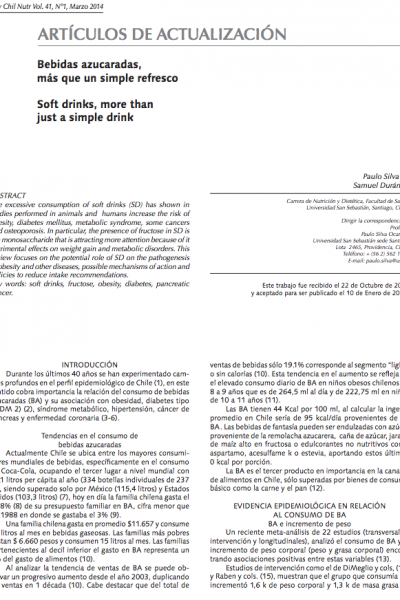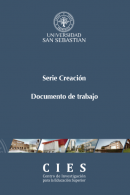
Bebidas azucaradas, más que un simple refresco
| PROCEDENCIA(S): | Ciencia y Medicina, Ciencias para el Cuidado de la Salud. |
|---|---|
| CATEGORÍA(S): | Abuso de Substancias, Endocrinología y Metabolismo, Epidemiología, Nutrición y Dietética, Sistema Cardiovascular y Cardíaco. |
| AUTOR(ES): | Paulo Silva O. Samuel Durán A.. |
| TIPO DE MATERIAL: | Artículos. |
| ARCHIVO: |
 Reconocimiento CC BY. Esta obra está bajo una Licencia Creative Commons Reconocimiento CC BY 4.0 Internacional.
Reconocimiento CC BY. Esta obra está bajo una Licencia Creative Commons Reconocimiento CC BY 4.0 Internacional.
The excessive consumption of soft drinks (SD) has shown in studies performed in animals and humans increase the risk of obesity, diabetes mellitus, metabolic syndrome, some cancers and osteoporosis. In particular, the presence of fructose in SD is the monosaccharide that is attracting more attention because of it detrimental effects on weight gain and metabolic disorders. This review focuses on the potential role of SD on the pathogenesis of obesity and other diseases, possible mechanisms of action and policies to reduce intake recommendations.
Resumen
Durante los últimos 40 años se han experimentado cambios profundos en el perfi l epidemiológico de Chile (1), en este sentido cobra importancia la relación del consumo de bebidas azucaradas (BA) y su asociación con obesidad, diabetes tipo 2 (DM 2) (2), síndrome metabólico, hipertensión, cáncer de páncreas y enfermedad coronaria (3-6).
ABSTRACT
The excessive consumption of soft drinks (SD) has shown in studies performed in animals and humans increase the risk of obesity, diabetes mellitus, metabolic syndrome, some cancers and osteoporosis. In particular, the presence of fructose in SD is the monosaccharide that is attracting more attention because of it detrimental effects on weight gain and metabolic disorders. This review focuses on the potential role of SD on the pathogenesis of obesity and other diseases, possible mechanisms of action and policies to reduce intake recommendations. Key words: soft drinks, fructose, obesity, diabetes, pancreatic cancer.



